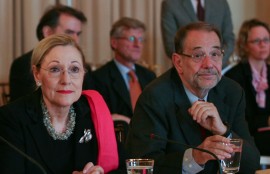
The constitution will go some way towards integrating these different policy areas. It proposes that the two key foreign affairs posts, the high representative representing the Council, and the Commissioner for foreign relations, should be merged, so that a single individual will carry out both functions as Minister for Foreign Affairs (I-27). This should strengthen the ability of both the Council and the Commission to have their foreign policy decisions implemented. The member states have the major diplomatic resources and all the military resources in the EU; the Commission can integrate foreign policy decisions with the other external policies of the Union, such as trade and development policy. Both the Commission and the member state governments need each other.
Decision-making: other than the integration described above, the decision-making of the EU on foreign policy will not change. The voting method in the Council will remain, as it was at Maastricht, unanimity on deciding policies with QMV for their implementation. The Council will continue to meet behind closed doors because the openness provisions apply only to legislative sessions.
Defence cooperation: there are new provisions to establish defence cooperation, including “the progressive framing of a common defence policy” but they stop far short of a European army. (Article I-11(4)). Decisions in this area will be taken by unanimity: any member state can block it (I-40(4)).
This commentary was contributed by Richard Laming, member of the Federal Union committee, on 22 October 2006. He may be contacted at [email protected]. The opinions expressed are those of the author and not necessarily those of Federal Union.
More information
Click here for more resources on the European constitution
